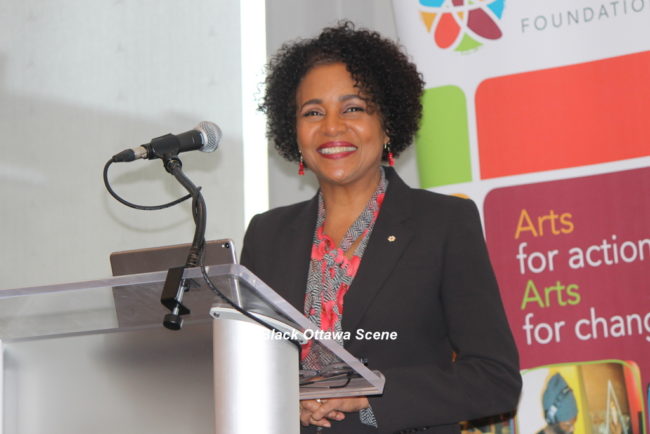Racism: A constant struggle
MICHAËLLE JEAN
CONTRIBUTED TO THE GLOBE AND MAILPUBLISHED JUNE 12, 2020
/cloudfront-us-east-1.images.arcpublishing.com/tgam/IAO3UJ5ZYBDNXPXEHN2EIOTMKI.JPG)
Michaëlle Jean was governor-general of Canada, UNESCO special envoy for Haiti and secretary-general of La Francophonie.
Of all the scourges afflicting humanity, the most devastating and recurrent is racism. Largely propelled by the ideological belief in the supremacy of a “white race,” this infamy was forged in the fire and fury of colonial conquest, a true calamity inflicted around the globe.
For centuries, colonialism feasted on the odious practice of mass enslavement of its conquered peoples, Black and Indigenous, deemed inferior, deprived of their humanity, robbed of their freedom, reduced to beasts of burden. A doctrine of radical domination decreed by European metropolises and monarchies led to the swift and bloody takeover and exploitation of whole territories and continents, in the so-called discovery of lands already inhabited. From a history of total dehumanization – profitable and well ordered as it was, allowing powerful empires to capture the wealth of the world – humanity did not emerge unscathed. Racism still rages on in a “systemic” way. And there comes the offending word, systemic. But what does it mean?
It’s in these demeaning behaviours, prejudices, attitudes, slurs and jibes. It’s in the harassment and unwarranted ethnic profiling. It’s in the distressing insinuations and putdowns, the idiotic remarks. It’s in these institutional and administrative policies, these decision-making and screening processes that exclude sections of the population, women, men, young people, because of their ethnic origin or the colour of their skin. To be Black, Indigenous or from other racialized groups is a constant struggle.
To us, racism feels like a succession of painful stings. It is never trivial, never harmless. It can be unwitting, but it always reeks of a history that suffocates our communities, like the cruel, forceful knee pressed against the neck of George Floyd in the violent and inhuman police intervention we saw in Minneapolis. The scene was filmed, the whole world was watching, but the act committed that day is just one in an unending string of deaths in police custody. “This is the latest in a long line of killings of unarmed African-Americans by U.S. police officers and members of the public,” the UN High Commissioner for Human Rights, my friend Michelle Bachelet, said in a strong statement calling for justice. But this is not just a U.S. affair. Covert racism is a creeping, multiheaded monster, a hydra coiled up in every society, perpetuating the legacy of hatred.
“We all watch in horror and consternation what’s going on in the United States,” the Prime Minister of Canada said. “It is a time for us as Canadians to recognize that we, too, have our challenges. That Black Canadians and racialized Canadians face discrimination as a lived reality every single day. There is systemic discrimination in Canada, which means our systems treat Canadians of colour, Canadians who are racialized, differently than they do others.”
As evidence of this, look to the thousands of Canadians, especially young people of all origins and colours, who have taken to the streets in recent days in many cities across Canada and around the world. Hear their chants: “Black Lives Matter! Our lives matter, too!” along with George Floyd’s last words, “I can’t breathe!” Because indeed, the air has become unbreathable with hatred of the other.
At the most recent National Black Canadians Summit, organized by the Michaëlle Jean Foundation, hundreds of participants came to share and discuss the devastating impact of racism on their lives, their physical and mental health, their safety, their present and their future, but most importantly to devise and demand a national action plan aimed at eradicating systemic racial discrimination across Canada. Connected to the United Nations’ International Decade of People of African Descent, the event draws attention to the fact that exclusion only creates gaping chasms, with monstrous deficits in participation, trust, growth, ideas, energy, perspectives, justice and democracy. The figures are stark and eloquent. How many studies, investigations, claims, testimonies have given us the facts! Here again, reckless indifference, neglect, inertia and denial out of vain complacency lead us straight into the greatest danger zone.
Let us remember that here, too, as in other countries, our past and present are interspersed with ethnic conflict and racial injustice. The Ku Klux Klan had bases in Canada, as did other fascist and Nazi organizations.
To this day, our country is not immune to extreme xenophobic movements whose voices find sympathetic resonance, including within certain political parties. It’s a global phenomenon and it calls for the utmost vigilance.
The current crisis sparked by the COVID-19 pandemic has brought to the fore the glaring inequalities generated by exclusion. We now see clearly how the most vulnerable communities, Black communities in this instance, are more strongly affected by the pandemic and its collateral damage.
Here again, we must open our eyes, act collectively and responsibly alongside those who are resisting on the front lines, the civil society organizations that spare no effort to counter the effects of exclusion, while striving to promote a genuine awareness of realities on the ground and their indispensable solutions.
Source: Globe and Mail

